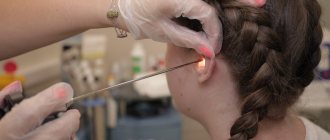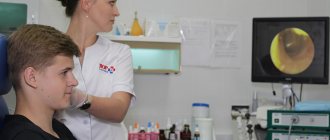Updated: 04/23/2021 15:29:36
Expert: Pogrebnoy Stanislav Leonidovich
*Review of the best according to the editors of expertology.ru. About the selection criteria. This material is subjective in nature, does not constitute advertising and does not serve as a purchase guide. Before purchasing, consultation with a specialist is required.
Tinnitus, or tinnitus, is a condition that can significantly impair quality of life, although the person does not experience any pain and can walk normally. But his whole life, and especially in silence, sometimes passes under the influence of almost constant noise, and this is very painful. It is estimated that almost 40% of people sometimes experience tinnitus, 8% call it constant, and every hundred people almost constantly suffer from debilitating noise that disturbs not only at night, but also during the day.
This problem has been most studied in the USA, and there 2 million patients with tinnitus are disabled, and 18 million patients are being treated for tinnitus of varying severity. It is surprising that completely deaf patients, who were born deaf, never complain of noise. It is also interesting that based on complaints about noise, it is impossible to make an accurate diagnosis of any disease (it is not a pathognomonic symptom). It is clear that the vast majority of patients with noise also have some degree of hearing loss.
How to determine tinnitus? This is a condition in which sound is felt in the ears or head, but there is no external acoustic influence. What is this unpleasant, disturbing feeling like?
Tinnitus: causes and treatment.
October 30, 2021
21551
4.7
5
Content
- Types of tinnitus
- Causes of tinnitus
- How to treat tinnitus
- Vinpocetine
- Aminazine
- Tanakan
- Preductal MR
- Cinnarizine
- Master Hearing
- Betagistine
- Atheroclephitis BIO
- Vasobral
- Bilobil Intense 120
Tinnitus (tinnitus) is a condition that does not cause the slightest pain, but can significantly impair the quality of life. A person constantly (especially in silence) hears noise, which is very painful. According to statistics, about 40% of people experience tinnitus from time to time. In the United States, for example, approximately 18 million people face this problem. Interestingly, patients who are deaf from birth never complain of tinnitus.
Types of tinnitus
ENT doctors classify tinnitus according to its causes. Vascular murmur occurs when the structures of the middle and outer ear are affected; tinnitus associated with muscle tension, and also central and peripheral, objective and subjective.
Objective tinnitus is the one that can actually be diagnosed. And subjective (the same tinnitus) is a phantom noise. That is, a person feels it, but in fact it is not there. Objective noise is a rare phenomenon, and even a stranger can hear it. For example, characteristic noises occur during the flow and discharge of blood from one basin of the cranial cavity to another (in a normal state it should not exist).
The noise may be on one side or both, intermittent or constant. Some patients complain of constant noise, while others complain of intermittent noise. Monotonous or pulsating, low-frequency or high-frequency, weak or intense. A person may report tinnitus as a primary or secondary complaint.
Read also Drugs to improve memory: neurologists recommend Drugs to improve blood circulation in the brain and memory.
A little about the reasons
There really is something to make noise in the human body. There may be a sound from the contraction of various muscles, from the movement of the temporomandibular joint and its ligaments, from the flow of blood in large and medium-sized vessels. But usually in a healthy person all these sound phenomena are very well disguised and are not detected. What are the most likely causes of the development of noise that can be heard by another person, that is, objective? Here they are: arthrosis of the temporomandibular joint, wide gaping of the auditory tube, myoclonus of the muscular structures of the middle ear, its tumors, narrowing of arterial vessels and their abnormal location, the presence of various shunts, or a pathological connection of arteries and veins, leading to direct discharge of blood from one pool to another, bypassing the capillary network. All this creates noise that is actually audible.
Subjective tinnitus, which is actually absent, may be a consequence of metabolic disorders and intoxication. It is caused by hepatitis, diabetes, atherosclerosis, a sharp drop in blood sugar, that is, hypoglycemia, and dysfunction of the thyroid gland. Much more often, subjective noise is caused by pathology of the ENT organs: otitis, cerumen, varying degrees of otosclerosis, sensorineural hearing loss and barotrauma, inflammation of the inner ear, that is, labyrinthitis and Meniere’s disease, other pathology.
Tumors of the cerebellopontine angle are quite common, and especially acoustic neuroma, which can be a source of noise. Taking many medications is to blame for the appearance of tinnitus. These are ototoxic antibiotics, such as kanamycin. It could also be methyl alcohol; it causes more than just blindness. In some cases, osteochondrosis of the cervical spine is to blame, which causes neurovascular symptoms, occupational factors, and multiple sclerosis. There are other reasons, and understanding them is the task of both an ENT doctor and an otoneurologist.
Causes of tinnitus
Doctors identify the following main causes of tinnitus:
- Cardiovascular disease, dysfunction or inflammation of the temporomandibular joint.
- Diabetes mellitus, which affects the hairs and auditory cells that form the nerve impulse.
- Problems with the cervical spine. Angiospasm or vascular tortuosity due to osteochondrosis. Because of this, increased blood turbulence develops.
- ENT pathology. Tinnitus can be a consequence of inflammation of the auditory nerve, diseases of the hearing centers in the cerebral cortex, or brain tumors.
- Arterial pressure. Tinnitus can develop due to high or low blood pressure, as well as due to taking certain medications.
Causes of tinnitus
Photos from open sources
Sensorineural hearing loss
The cause of hearing loss and a feeling of fullness in the ears may be sensorineural hearing loss, which occurs as a result of a violation of the blood supply or innervation in the inner ear.
Sensorineural hearing loss can result from:
- changes in blood pressure due to hypertension;
- acute viral diseases;
- barotrauma;
- fracture of the base of the skull;
- ischemia of the central areas of the auditory analyzer;
- neuroma of the vestibulocochlear nerve;
- compression from the outside by neoplasms and vascular aneurysms.
How to treat tinnitus
Doctors are not always able to determine the cause of tinnitus. Tinnitus can be a consequence of many diseases. And only if you start treating the underlying disease, you can get rid of tinnitus. The problem can be treated both conservatively and surgically. As for medications for tinnitus, these can be various vascular agents, muscle relaxants, nootropics, vitamins, allergy medications, painkillers, diuretics and medications that improve blood circulation in the auditory analyzer.
Our list includes medications that are most often prescribed for tinnitus.
Treatment
Finally we get to the treatment of tinnitus. But, before we begin to describe medications, it should be recalled that the true cause of noise is not always determined by doctors. Noise can be a sign of many diseases. And if the underlying disease, such as atherosclerosis or diabetes, is successfully treated, then tinnitus disappears or significantly decreases.
Tinnitus can be treated with both conservative methods and surgical interventions. What medications are used for tinnitus? These are various vascular agents, nootropics, muscle relaxants and vitamins, antihistamines and anesthetics, diuretics and drugs that normalize the blood supply to the auditory analyzer. Let's look at the medications that ENT doctors most often use in their practice to normalize the patient's condition and reduce noise, or get rid of it altogether.
At the beginning of the description of each drug, its international nonproprietary name, or INN, is indicated, followed by the names of the drugs. The first is usually the best original drug, first developed and introduced into clinical practice, and then its commercial copies, or generics. The price range is also given for both the original drug and its analogues. The cost of medicines is relevant for pharmacies of all forms of ownership in the Russian Federation as of September 2019. And let's start the review with drugs that normalize metabolism and blood supply in the area of the hearing organ.
Vinpocetine
A very effective drug for tinnitus, aimed at improving blood circulation in the brain, stimulating metabolic processes, concentration, and improving memory. Vinpocetine has a beneficial effect on blood rheological parameters. It is prescribed for hearing loss, Minière's disease and tinnitus. In reviews, patients write that Vinpocetine is no worse than the expensive drug Mexidol. The doctor determines the duration of treatment and dosage of the drug. With long-term use of Vinpocetine, some patients report dry mouth and headaches. At the same time, the medicine is quite affordable, and its effectiveness has been confirmed. Contraindications: age under 18 years, low blood pressure, etc.
Vinpocetine
"Moskhimfarmpreparaty" named after. N. A. Semashko, Russia; ALSI Pharma, Russia; Biocom, Russia; Izvarino Pharma, Russia
Neurology: symptomatic treatment of the consequences of ischemic stroke, vascular vertebrobasilar insufficiency, vascular dementia, cerebral atherosclerosis, post-traumatic, hypertensive encephalopathy.
Ophthalmology: chronic vascular diseases of the retina and choroid. Otology: perceptual hearing loss, Meniere's disease, tinnitus. from 29
5.0 1 review
1276
- Like
- Write a review
Means that normalize blood circulation and metabolism
The group of these drugs includes vinpocetine, Ginkgo Biloba derivatives, ergot, slow calcium channel blockers, and antihypoxants. Of course, they are used not only for tinnitus, but also for other diseases. After all, a special medicine that is used only for tinnitus, and nowhere else, is not yet known to science.
Vinpocetine (Cavinton, Telektol)
Popularity rating:* 4.9
Vinpocetine has already been repeatedly described in various medicinal reviews as a remedy for chronic cerebral ischemia, to improve memory and attention. Vinpocetine is a modified vinca alkaloid, its task is to optimize cerebral blood flow, it dilates blood vessels, and reduces aggregation, or sticking together of platelets. In addition to tinnitus and hearing loss, the drug is indicated for vascular dementia and ischemic strokes. Cavinton is prescribed for vertebrobasilar artery syndrome, retinal degeneration, encephalopathy and Meniere's disease. It is indicated for cerebral atherosclerosis, various forms of headaches, the consequences of traumatic brain injuries and memory loss.
Cavinton and Vinpocetine are taken after meals; there is also a new form - Cavinton Comforte. It is more active and contains 2 tablets of regular Cavinton, 5 mg each, that is, the dose is 10 mg. The drug is taken from one to 3 times a day, and is available in tablets that dissolve and do not need to be swallowed. The tablets have a pleasant orange taste.
Cavinton Comforte 0.01 No. 30 costs from 240 to 420 rubles in pharmacies; it is a Hungarian drug produced by Gedeon Richter. The cheapest domestic Vinpocetine can be purchased at a price of 25 rubles, it is produced by the Irbit Chemical Pharmaceutical Plant, dosage 5 mg No. 20.
Advantages and disadvantages
The disadvantage of Cavinton is the fact that there is a slight increase in the heart's need for oxygen, and therefore it is not prescribed for angina pectoris, heart failure, or cardiac arrhythmias. If Cavinton is used parenterally intravenously, it should be administered very slowly.
Ginkgo biloba (Tanakan, Bilobil, Ginkum, Memoplant)
Popularity rating:* 4.8
All medications Ginkgo Biloba improves metabolism and blood fluidity, or its rheological properties. In addition, the drugs are easily stimulating, have a mild antidepressant effect, and are most indicated for patients with short-term exposure to tinnitus. It is important that Tanakan has registered itself well in modern double-blind, placebo-controlled studies.
It is very important that the plant raw materials in Tanakan, which are used for medicines, are clearly dosed and standardized. Taking Tanakan is indicated for any form of cognitive deficit, pathology of the arteries of the lower extremities, and the presence of intermittent claudication, vascular impairment of vision and hearing, as well as Raynaud's syndrome and disease. Tanakan can be used for hearing disorders and tinnitus, one tablet three times a day, and the course of treatment is long, at least 3 months. You can take Tanakan for up to six months or even longer, but only as prescribed by a doctor.
Tanakan, manufactured by Bofur Ipsen, is one of the best and purified medicines containing Ginkgo Biloba leaf extract. Pack of 40 mg tablets, 90 pcs. will cost from 1200 to 1900 rubles, the drug is made in France. Much cheaper is the drug Bilobil, 60 capsules of which in the same dosage can be bought at prices starting from 550 rubles, produced in Slovenia, KRKA. The drug Ginkoum, which is produced by the domestic company Evalar in the same dosage, in the same quantity, costs Tanakan and will cost you from 530 to 860 rubles.
Advantages and disadvantages
Tanakan is usually very well tolerated and has no overdose effects. However, the drug can cause in rare cases, less than 1%, headache, nausea, rash, dizziness. Experience with Tanakan has shown that the severity of side effects does not depend on the duration of treatment, but if they occur, the drug should be stopped. Despite its good tolerability, Tanakan in tablets (and also in syrup) is contraindicated for erosive gastritis, gastric ulcers, stroke and acute myocardial infarction, and decreased blood clotting. The medicine is not recommended for pregnant and lactating women. Tanakan tablets contain lactose, so it should not be prescribed to patients with a congenital disorder of lactose metabolism. Perhaps the biggest disadvantage is the high cost and the need to take it for several months, but in the case of tinnitus, all medications are taken for quite a long time.
Cinnarizine (Stugeron, Vertizin)
Popularity rating:* 4.7
Stugeron is a fairly old drug, it was used back in the Soviet Union, and indications also include migraine, transient ischemic attacks, various forms of dizziness, the recovery period after strokes, both ischemic and hemorrhagic, vascular disease, and memory loss. Quite often it was prescribed as a cure for headaches. This drug is a calcium channel blocker that is particularly capable of improving vestibular blood flow, as well as peripheral blood flow in the coronary vessels of the heart. Cinnarizine also improves the body's resistance to hypoxia.
Cinnarizine is available in 25 mg tablets, and its effect is to inhibit the release of vasoactive substances. These are adrenaline, dopamine, histamine, bradykinin. It improves the ability of red blood cells to deform, reduces blood viscosity and increases its fluidity. For tinnitus, you need to take the drug 25 mg, that is, one tablet three times a day. It is also indicated for air or sea sickness, that is, for kinetosis, half an hour before a flight or departure of a sea vessel.
The drug Stugeron, which is produced by the Hungarian company Gedeon Richter, will cost from 186 rubles, this is 50 tablets of 25 mg. The cheapest cinnarizine of the same dosage can be purchased at a price of 35 rubles, and it will be a Bulgarian drug from Sopharma.
Advantages and disadvantages
Despite its effectiveness, strict monitoring is necessary, since long-term use of cinnarizine in high doses can enhance the depressive effect and induce the development of drug-induced parkinsonism.
Stugeron also has quite pronounced side effects. These include abdominal discomfort and dry mouth, weight gain with long-term use and sweating, headaches and bouts of drowsiness, development of jaundice and allergies. It should also be remembered that the effect of Stugeron can be enhanced by taking antidepressants, as well as alcohol.
Trimetazidine (Preductal MV, Angiozil, Deprenorm, Rimekor, Trimectal)
Popularity rating:* 4.6
These are antihypoxic drugs that increase the resistance of the tissues of the middle and inner ear and labyrinth to low amounts of oxygen, and help increase cerebral and labyrinthine blood flow. Preductal and its analogs will be most effective for tinnitus if the patient has a peripheral disorder, for example, cochleovestibular syndrome, and at the same time in combination with cardiac pathology. In this case, Preductal will increase both myocardial reserves and its resistance to hypoxia. Preductal should be taken one tablet twice a day, with meals.
The original slow-release drug Preductal (MB), produced by Servier (France), is considered to be the best in quality, but it is not always available in pharmacies. One package of capsules of 35 mg No. 60 can be purchased in pharmacies at a price of 2964 rubles. The cheapest trimetazidine is probably 20 mg tablets No. 30, which will cost from 70 rubles. and higher. This is domestic trimetazidine, produced by Ozon. What kind of substance is there and why it is so cheap is unknown.
Advantages and disadvantages
When taking Preductal, contraindications must be taken into account. These are disorders of the extrapyramidal system, Parkinson's disease and restless legs syndrome, severe renal failure, pregnancy, breastfeeding and persons under 18 years of age. There may also be side effects, the most common of which are abdominal pain, diarrhea, dizziness and unsteadiness of gait, and skin rash.
Dihydroergocryptine + caffeine (Vasobral)
Popularity rating:* 4.5
This medicine is a derivative of ergot alkaloids with caffeine added to balance the effects. As a result, this medicine blocks alpha-adrenergic receptors, which are located in the blood vessels, and simultaneously stimulates the structure of the central nervous system, which regulate the synthesis of serotonin and dopamine. When exposed to the drug, vascular permeability decreases, aggregation of blood cells decreases, blood flow increases, and metabolism in the brain structures intensifies. All this leads to increased resistance of tissues and their ability to withstand hypoxia. Caffeine additionally stimulates the cerebral cortex, improves the functioning of the vasomotor and respiratory centers, and helps improve mental performance and reduce fatigue.
In addition to tinnitus and tinnitus, Vasobral is indicated for cerebral atherosclerosis, in complex therapy for rehabilitation measures after a stroke, for Meniere's disease, and in the treatment of acute and chronic labyrinthitis. Vasobral should be taken orally, 1 tablet 2 times a day, the duration of treatment is at least 2 months, and if necessary, the courses can be repeated up to 2 times a year. Vazobral is not cheap; a pack of 30 tablets will cost from 986 rubles.
Advantages and disadvantages
The disadvantage of Vasobral can be considered its high cost, as well as some side effects, which are most often manifested by nausea, abdominal discomfort, and symptoms of dyspepsia, that is, a feeling of heaviness in the abdomen, bloating, belching, and so on. If such symptoms from the gastrointestinal tract occur, as the official instructions state, discontinuation of the drug is not required. Very rarely, tachycardia, decreased blood pressure, and interaction with some blood pressure medications occur, where they will enhance their effect.
Aminazine
This drug is an antipsychotic with a sedative effect. Aminazine reduces psychomotor agitation. The drug is prescribed for many problems, including Minière's disease and tinnitus. "Aminazine" relieves restlessness and anxiety, and also reduces physical activity. You can buy Aminazine in tablets and injections with a prescription. This drug is prescribed infrequently and in very small dosages. Aminazin has a lot of contraindications, so it is taken under the strict supervision of a doctor, only in complex therapy.
Aminazine
PJSC Valenta Pharm, Russia
Chronic paranoid and hallucinatory-paranoid states, states of psychomotor agitation in schizophrenia (hallucinatory-delusional, hebephrenic, catatonic syndromes), alcoholic psychosis, manic agitation in manic-depressive psychosis, mental disorders in epilepsy, agitated depression in patients with presenile psychosis, manic depressive psychosis, as well as other diseases accompanied by agitation and tension.
Neurotic diseases accompanied by increased muscle tone. Persistent pain, incl. causalgia (in combination with analgesics), persistent sleep disorders (in combination with sleeping pills and tranquilizers). Meniere's disease, vomiting in pregnancy, treatment and prevention of vomiting during treatment with antitumor drugs and radiation therapy. Itchy dermatoses. As part of “lytic mixtures” in anesthesiology. from 55
605
- Like
- Write a review
Listen to the noise!
As a rule, if the labyrinth and cochlea are damaged, the noise is very loud and painful. If there is an intracranial tumor, the noise is usually associated with headache. The stronger the headache, the stronger the tinnitus, and it can decrease with a decrease in intracranial pressure. If the patient has a tumor of the posterior cranial fossa, then the noise will respond to a change in the position of the body in space, and if there is a suspicion of a tumor of the cerebellopontine angle, then the noise will be asymmetrical and localized in half the head, in the back of the head or on the side of one ear. The vascular murmur will pulsate and the patient will report that it has a soft blowing or hissing tone. If you press on the jugular vein in such a patient, you can sometimes hear complaints from him about the intensification of such noise.
If a person has a dysfunction of the auditory tube, or the sound conducting systems of the middle and outer ear, then most often the noise is of low frequency, hearing decreases, and congestion is felt in the affected ear. The typical course of Meniere's disease causes tinnitus. Usually the noise intensifies before an attack of illness, it reaches its greatest strength at the height of the attack, and then decreases.
Finally, there are many congenital and hereditary conditions that cause tinnitus. This is Arnold-Chiari syndrome, with a violation of the structure of the arches of the atlas and the descent of the cerebellar tonsils below the anatomical boundaries, hereditary neuroma of the auditory nerve, abnormal development of the vertebrae, hereditary damage to the geniculate ganglion.
If you blow your nose sharply, quickly dive or rise from the depths during takeoff and landing of an airplane, tinnitus may occur as a consequence of barotrauma. In extreme cases, ear pain, dizziness, nausea and dizziness occur. Explosions and shots fired close to the ear often lead to barotrauma.
If there is a tumor of the middle ear, there may be a combination of hearing loss with unilateral pulsating noise. The doctor should take a particularly careful history if he suspects that the noise was induced by any medication. Currently, this is caused by many aminoglycoside antibiotics, diuretics, common non-steroidal anti-inflammatory drugs - Diclofenac, Indomethacin and Ibuprofen, blood pressure medications - Enalapril, Monopril. This could be Nifedipine, medications for depression, and other drugs. Of the antibiotics, the most ototoxic are gentamicin, streptomycin, kanamycin and tobramycin.
Tanakan
"Tanakan" is a herbal preparation with high bioavailability. It is prescribed for tinnitus, problems with memory and attention. Tanakana contains an extract of the ginkgo biloba plant, which helps the brain receive more oxygen and glucose. The drug stimulates metabolic processes, improves blood circulation in the brain and arterial tone. The bioavailability of Tanakan is about 80-90%, but be prepared for a long course of treatment (at least three months). Within a month you will feel a significant improvement in your condition. Contraindications include age under 18 years.
Tanakan
IPSEN (Bofur Ipsen), Ukraine
Tanakan is a herbal preparation, the effect of which is due to the ability of the active substance to influence metabolic processes in cells, improve the rheological properties of blood and microcirculation (blood movement in the smallest vessels of the body).
Used for: discirculatory encephalopathies of various origins (post-stroke, consequences of traumatic brain injury, senile), manifested by impaired attention and memory, sleep disturbance, decreased intellectual abilities of a person; neurosensory disorders (due to diabetic retino- or polyneuropathy, dizziness, hypoacusis, tinnitus); disruption of normal peripheral circulation, including as a result of Raynaud's disease; asthenic conditions, i.e. conditions characterized by signs of general exhaustion of the body due to psychogenic, neurotic, traumatic processes. from 485
1120
- Like
- Write a review
Preductal MR
"Preductal" is one of the most effective drugs for the treatment of tinnitus with a quick effect and prolonged action. The active substance of the drug is trimetazidine dihydrochloride. Only a doctor should prescribe “preductal” for tinnitus, and he will select the optimal dosage of the drug. The first positive results when taking Preductal are noticeable within two to three days. The drug improves cellular nutrition and improves blood circulation in the brain. The only disadvantages of the drug are its high price and the fact that Preductal cannot be purchased in all pharmacies.
Preductal MR
Serdix LLC, Russia
For adults, Preductal MR is indicated for the symptomatic treatment of stable angina with insufficient effectiveness or intolerance to first-line antianginal drugs, as well as in ENT practice, the drug reduces the frequency of development and intensity of tinnitus, and reduces the likelihood of its relapse.
Expands the perceived sound range in case of perceptual deafness. from 353
564
- Like
- Write a review
Read also: 10 safest sedatives The best natural sedatives.
Cinnarizine
One of the best remedies for cerebrovascular accidents and for the treatment of tinnitus. “Cinnarizine” has a positive effect on the blood vessels of the brain, stimulates blood circulation, and reduces the excitability of the vestibular apparatus. Cinnarizine is prescribed for ringing, tinnitus and Minière's disease. Patients note that while taking this medication, the first improvements are noticeable after one to two weeks. "Cinnarizine" is not used in pregnant women and during lactation, in children under 6 years of age. Among the advantages of this drug: affordable cost, comprehensive treatment of tinnitus, memory impairment, mental fatigue, and decreased concentration. Possible side effects are dry mouth and drowsiness.
Cinnarizine
Update, Russia; JSC Avexima, Russia; JSC "Tatkhimfarmpreparaty", Russia; JSC Dalkhimfarm, Russia; PJSC "Biosintez", Russia; Ozon LLC, Russia
Symptoms of cerebrovascular insufficiency (dizziness, tinnitus, headache, memory impairment, decreased concentration);
vestibular disorders (including Meniere's disease; dizziness, tinnitus, nystagmus, nausea and vomiting of labyrinthine origin); prevention of kinetosis (“road sickness” - sea and air sickness); migraine (prevention of attacks); peripheral circulatory disorders: Raynaud's disease, intermittent claudication, acrocyanosis, trophic disorders (including trophic and varicose ulcers). from 20
5.0 1 review
1453
- Like
- Write a review
Drugs of other groups
Since medications used to treat tinnitus from other groups are used individually, we decided to combine them all together. This will include drugs that modulate histaminergic transmission, various phenothiazine derivatives, which are classified as antipsychotics, and block pathological autonomic afferentation. These are tranquilizers, which are also prescribed in the complex treatment of tinnitus and sleep disorders, phenobarbital, which has a pronounced sedative effect, and is used as second-line drugs. This also includes psychostimulants, which are used with anticholinergics and antihistamines, which potentiates their effect. These are also B vitamins and other drugs; let’s look at some of them in more detail.
Betahistine (Betaserc, Betaver, Vazoserc, Vertran, Vestibo, Tagista)
Popularity rating:* 4.9
Betahistine is a histamine receptor blocker, modulates the transmission of histamine and serotonin, and is effective not only for tinnitus, but also for other vestibular disorders: dizziness, nausea and vomiting.
Betaserc causes expansion of the arterial part of the capillaries, normalizes the endolymph pressure gradient in the labyrinth and in the tissues of the cochlea, which improves the condition in patients with dizziness. Along the way, it increases the tone of the smooth muscles of the bronchial tree and gastrointestinal tract, which leads to increased secretion of gastric juice. Betahistine is indicated for vestibular neuronitis, benign positional vertigo, as a means of prevention after neurosurgical operations, and for vertebrobasilar insufficiency.
It is advisable to take the drug at the beginning of therapy at 8 mg or 16 mg 3 times a day. Treatment should be long-term, but the duration is determined by the doctor.
The drug has different dosages; 16 mg tablets in an amount of 30 pieces will cost from 608 rubles. Tablets 24 mg 20 pieces from 529 rubles, and tablets 24 mg 60 pieces will cost from 1283 rubles. Betaserc is manufactured by Abbott, the Netherlands.
The cheapest domestic Betahistine can be found in a pharmacy from 71 rubles, this is 16 mg No. 30.
Advantages and disadvantages
The drug is quite well tolerated, but has a small range of side effects. It is undesirable to prescribe it for bronchial asthma, exacerbation of stomach ulcers, and also in the presence of pheochromocytoma. Naturally, the drug is contraindicated for pregnant women, especially in the first trimester, as well as during breastfeeding. If the patient experiences dyspeptic symptoms due to the medicine, then it is better to take Betahistine after meals. If the patient has allergies and takes antihistamines, they reduce the effect of taking Betaserc, this must be remembered.
Aminazine
Popularity rating:* 4.8
Aminazine blocks vegetative impulses in the parasympathetic nuclei and in the cortical parts of the auditory analyzer. It blocks central contacts between adrenergic and dopaminergic synapses. The drug is rarely prescribed, in complex therapy and only in severe cases. Aminazine is classified as an antipsychotic, which means that it is strictly a prescription drug. Usually they treat psychoses, phobias, withdrawal symptoms and delirium tremens, that is, delirium tremens. In addition, it is used to treat delusions and hallucinations, so the main range of applications is psychiatry, large and small. However, it is also used in the treatment of dermatitis, vomiting in pregnant women, Meniere's disease and other disorders of hearing and vestibular function, including tinnitus.
The drug is available in tablets and ampoules; for the treatment of tinnitus it is used only in complex therapy, in severe cases and in small doses, as determined by the doctor.
A pack of 10 tablets of chlorpromazine, 50 mg each, can be purchased at a price of 200 rubles, produced by the Russian pharmaceutical company Valenta Pharmaceuticals.
Advantages and disadvantages
Aminazine cannot be used for a long time; this drug is exclusively a prescription drug, and even ENT doctors may have difficulties prescribing it. It is contraindicated in all severe disorders of the function of internal organs, including cardiovascular pathology and prostatic hyperplasia. Aminazine has pronounced side effects, including extrapyramidal and parkinsonian reactions, a drop in blood pressure, jaundice and leukopenia may occur. While taking it, impotence may develop, the menstrual cycle may be disrupted, and body weight may increase.
There are a lot of special instructions, for example, a ban on drinking alcohol during treatment with aminazine, and there are also many drug interactions. Thus, aminazine reduces the threshold of convulsive readiness if it is used together with anticonvulsants, if it is prescribed together with medications for increased thyroid function, then it has a harmful effect on the blood. But in some cases, it can still relieve severe symptoms of noise, and it is recommended for use by official instructions, which is why it is on the list.
Milgamma
Popularity rating:* 4.7
Finally, since disturbances in nerve conduction, reduced trophism of the afferent portions of the auditory nerve, a disorder in the transmission of nerve impulses and the appearance of noise play a great role in the pathogenesis of tinnitus, the use of B vitamins, which are neurotropic, is indicated in complex therapy. One of these drugs will be the well-known Milgamma Compositum, which is available in both tablets and dragees. Milgamma compositum contains vitamins B1, B6, and the ampoule of Milgamma contains vitamins B12. In addition to tinnitus, Milgamma is prescribed for neurological diseases: trigeminal neuralgia, herpes zoster, polyneuropathy, including diabetic and alcoholic, shooting pain in the back, that is, lumbago with sciatica.
The drug must be taken one tablet per day; according to the doctor’s indications, the dose can be increased to one tablet three times a day. Treatment usually lasts for a period of 1 month. Dragees Milgamma compositum in the amount of 30 pieces, designed for a month of treatment, will cost from 625 rubles, and it is produced by the German company Vorvag Pharma.
Advantages and disadvantages
Milgamma also has disadvantages, these are symptoms of overdose, which can even lead to a neurotoxic effect, and if the medicine is used for longer than six months, then sensitivity disorders and weakness in the arms and legs may occur, that is, the opposite effect. Despite the seeming harmlessness of vitamins, there may be side effects. These are skin itching, urticaria and rash, Quincke's edema. Sometimes there may be nausea, increased sweating, and tachycardia, so it is still better to use Milgamma on the recommendation of a doctor and under his supervision.
There are probably no other medications that can cure this disorder, and even these alone are unlikely to do anything in advanced cases. Tinnitus is treated comprehensively, using physiotherapeutic methods of treatment, with hearing aids, especially if tinnitus is combined with hearing loss. In some cases, even surgical treatment is indicated. One of the methods affects the cervical sympathetic nodes, and the second method is to influence specific auditory structures. This is tympanoplasty, stapedoplasty. Such operations can be used to reduce tinnitus, the source of which is the hearing organ itself.
*The popularity rating is based on an analysis of demand data from the wordstat.yandex.ru service.
Master Hearing
This anti-noise medication comes in the form of propolis ear drops that do not contain alcohol. “Master Hearing” has antibacterial and anti-inflammatory effects. The drops are often prescribed for tinnitus and are a 100% natural product that does not cause side effects. “Master Hearing” improves cerebral circulation and accurate transmission of sound impulses. Often these drops are prescribed as a prevention of hearing problems for those who are forced to work in high-noise environments. The minimum course of treatment with Master Hearing is a week.
Master Hearing
Sashera-Med LLC, Russia
A natural remedy that allows you to avoid hearing loss and stop the negative processes occurring in the hearing aid.
The action of the drops is aimed at restoring the cells of the eardrum, the auditory nerve, improving blood circulation and transmission of impulses to the corresponding part of the brain, eliminating inflammation and the source of infection during purulent processes. 5.0 1 review
622
- Like
- Write a review
Diagnosis of ear congestion
Standard examinations for any ear pathology:
- video endoscopy or microscopy of the ear;
- video endoscopy of the nose and nasopharynx;
- audiometry;
- tympanometry;
If necessary, additional studies are prescribed:
- computed tomography or magnetic resonance imaging of the temporal bones and brain;
- culture of nasal discharge and external auditory canal for flora and sensitivity to antibiotics;
- general blood test, blood glucose (other additional laboratory tests are possible after consulting a doctor);
- Doppler ultrasound of neck vessels;
- consultations with other specialists.
Betagistine
This tinnitus drug blocks histamine receptors, so it perfectly treats not only tinnitus, but also other disorders of the vestibular system (dizziness, nausea and vomiting). Betahistine does not cause drowsiness or lethargy, so it can be taken by patients whose work requires increased concentration. The course of treatment with the drug is determined by the doctor. Already at the very beginning of treatment, many patients note positive dynamics, and a lasting effect occurs after two weeks of treatment. You need to take Betagistin for a long time. Possible side effects include nausea and allergic reactions. Pros: fast action, reasonable price. You should carefully read the instructions for the drug, because there are many contraindications.
Betagistine
CJSC "Northern Star" (NW), Russia; CJSC VERTEX, Russia; OZON, Russia; Kanonpharma Production (Canon), Russia; PJSC “Kiev Vitamin Plant”, Ukraine; Pharmtechnology LLC, Belarus; Pranafarm LLC, Russia
Betahistine is indicated for the symptomatic treatment of recurrent dizziness with or without cochlear symptoms.
from 51
966
- Like
- Write a review
Atheroclephitis BIO
Sometimes the cause of tinnitus is atherosclerosis. It is in such cases that doctors often prescribe Atheroclephitis BIO. The drug helps treat episodic or persistent tinnitus. This is a completely natural remedy, which contains red clover and dioscorea. "Atheroklefit BIO" maintains normal blood cholesterol levels. The product improves the functioning of the heart and blood vessels, protecting them from the negative effects of atherosclerosis. The minimum course of treatment is 1 month (then you need to take a 10-day break). Contraindications include pregnancy and breastfeeding. Pros: convenient release form, high efficiency, naturalness and safety.
Atheroclephitis Bio
Evalar, Russia
Dietary supplement.
Flavonoids contained in red clover help cleanse blood vessels of cholesterol, thereby preventing the development of atherosclerosis. As a result of the use of Atheroclephitis, favorable changes in lipid metabolism, strengthening of the walls of blood vessels, a decrease in thrombus formation and a decrease in cholesterol levels in the blood are observed. According to reviews, atheroclephitis is well tolerated and reduces the manifestation of various symptoms of vascular disorders - palpitations, dizziness and tinnitus. from 207
5.0 5 reviews
925
- Like
- Write a review
Vasobral
"Vazobral" contains, among other active substances, caffeine (40 mg), which helps fight fatigue and drowsiness. “Vasobral” strengthens blood vessels, stimulates blood circulation and metabolic processes in the brain. Caffeine works as a psychostimulant, so it successfully fights tinnitus. This drug is well suited for those who have tinnitus - an episodic problem. The drug does not cause drowsiness or decreased concentration; the course of treatment is one to two months (treatment can be repeated, but not more than twice a year). Vasobral is contraindicated for pregnant and lactating women. Among the advantages are improved performance (mental and physical), effective treatment of tinnitus. The only drawback is the high price.
Vasobral
Chiesi, France
A nootropic drug that is used for: Decreased mental activity, impaired attention and memory, impaired spatial orientation caused by age-related changes;
- cerebrovascular insufficiency (including due to cerebral atherosclerosis); - consequences of cerebrovascular accident; - migraine prevention; - vestibular and labyrinthine disorders (dizziness, tinnitus, hypoacusia) of ischemic origin; - Meniere's disease; - retinopathy (diabetic and hypertensive); - peripheral arterial circulation disorders (Raynaud's syndrome and disease); - venous insufficiency. from 879
5.0 3 reviews
1244
- Like
- Write a review
Bilobil Intense 120
This drug perfectly suppresses tinnitus, improves memory and concentration. Bilobil Intense 120 contains 120 mg of ginkgo biloba extract. This substance improves blood circulation in the brain by dilating blood vessels. With regular use of this drug, you can get rid of not only tinnitus, but also improve attention, memory and intellectual abilities. Within two to three weeks, patients notice a significant improvement in their condition. To achieve maximum effect, you need to take Bilobil Intense 120 for at least three months. You can buy Bilobil Intense without a prescription. The undoubted advantages of the drug: natural composition, absence of side effects and excellent effectiveness.
Bilobil intensity 120
KRKA (KRKA), Slovenia
A nootropic drug that is used for: Discirculatory encephalopathy of various etiologies (developing as a result of stroke, traumatic brain injury, in old age), accompanied by decreased attention, weakened memory, decreased intellectual abilities, and sleep disturbances;
- violation of peripheral circulation and microcirculation (including arteriopathy of the lower extremities, intermittent claudication), Raynaud's syndrome; — neurosensory disorders (dizziness, tinnitus, hypoacusis); - age-related macular degeneration; - diabetic retinopathy. from 152
4.0 1 review
414
- Like
- Write a review








